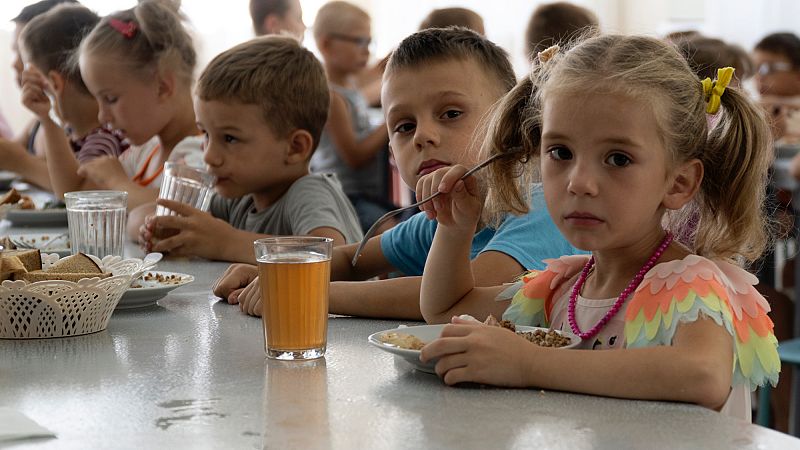Stolen children 'marketplace': Russia creates 'catalogue' of Ukrainian kids for adoption

Russia-installed occupation authorities in Ukraine’s Luhansk region created an online “catalogue” of Ukrainian children, offering them for coerced “adoption” through the education department.
The database includes 294 Ukrainian children, who are sorted and categorised so that the users can “filter” them by age, gender and physical traits, like eyes and hair colour.
The children are advertised for their character traits, with some described as "obedient" or "calm".
In numerous cases, the children are described as “polite and respectful towards the adults”, “disciplined” and “not conflictive” or “can be relied on to execute tasks”.
Users can also “filter” the search by the preferred form of guardianship, such as adoption or foster care.
The Russian-run database describes the children listed in the database as “orphans and children left without parental care”.
Mykola Kuleba, CEO of the Save Ukraine organisation, said most of the children from this “catalogue” were born in Ukraine’s Luhansk region before Russia occupied it and had Ukrainian citizenship.
“Parents of some of them were killed by occupation authorities, others were simply issued Russian identification documents to legitimise their abduction.”
Kuleba said that many children who grew up in territories occupied since Russia’s first invasion of 2014, including Crimea and parts of eastern Ukrainian regions of Donetsk and Luhansk, have been “systematically deported and transferred to Russian families in Moscow and other Russian regions.”
“This isn’t a new tactic. Since 2014, Ukrainian children have appeared in Russian adoption databases. However, since 2022, the practice has become widespread and systematic”, Kuleba said on X.
He added that initially Russian authorities tried to cover their tracks, shutting down registers and erasing references, but “now, the pretence is gone”.
“Russia isn’t even trying to hide it anymore. Ukrainian orphans are displayed like products in an online marketplace”.
Kuleba called it “state-sponsored child trafficking”, adding that Russian authorities have updated the laws to be able to alter the children’s surnames and birthdays.
The head of Save Ukraine organisation said Russia has “streamlined” the system to such an extent that “a Ukrainian child can now be effectively 'ordered' online” and “stripped of their identity, issued a Russian passport, and subjected to ideological control” with a single click.
Kuleba also issued a stark warning that the platform exposes the children to significant dangers, including sexual exploitation, human trafficking, illegal adoption and trafficking for organ harvesting.
Forceful deportation of Ukrainian children by Russia
Ukraine has been able to verify Russia’s deportation of over 19,500 children to date. These are the children for whom detailed information has been collected — their place of residence in Ukraine and their territorial location in Russia are known.
Only over 1,350 have been returned, and each return is mediated by a third-party state, notably by Qatar, South Africa and the Vatican.
The actual figure is likely to be much higher.
Yale’s Humanitarian Research Lab placed the number of deported Ukrainian children closer to 35,000. Moscow claimed that the number could be as high as 700,000.
The US-based Institute for the Study of War think tank (ISW) stated that stealing the children was one of Russian President Vladimir Putin’s priorities, referring to the revelations of Ukrainian human rights activists.
The ISW uncovered Kremlin documents dated 18 February 2022, which laid out plans to remove Ukrainian children from orphanages in occupied Luhansk and Donetsk regions and bring them to Russia under the guise of “humanitarian evacuations”.
During the Istanbul talks between Ukraine and Russia, Kyiv delegation handed over to Russia a list of its forcefully deported children.
Kyiv wants Moscow to return them to Ukraine, reiterating its commitment to bring the forcefully deported children back as one of the key aspects of a possible ceasefire and a peace deal in the long term.
“If Russia is genuinely committed to a peace process, the return of at least half the children on this list is positive," head of the Ukrainian delegation Rustem Umerov said.
The Russian delegation chief Vladimir Medinsky showed the list, which contains the names of 339 abducted Ukrainian children.
The Kremlin representative accused Ukraine of "staging a show on the topic of lost children aimed at kind-hearted Europeans." In his words, Kyiv is trying to "squeeze out a tear by raising this issue."
Euronews sources familiar with this aspect of the negotiations say Moscow knows exactly where every child on that list is.
Today

